Development: how SA fares among others
by Staff Writer,
2013-11-01 07:46:05.0
BRAND SA works hard to improve South Africa’s global reputation and to position the country as an investment destination and trade partner, says Brand SA CEO Miller Matola.
"The purpose of this work is to contribute to South Africa reaching its defined strategic goals of internal human and economic development, while also contributing positively to the African and global environments," he says.
In a year when South Africa hosted the first annual Brics (Brazil, Russia, India, China and South Africa) summit on the African continent, the theme of the fifth summit reflected changes taking place in the global political economy.
The theme, Brics and Africa: Partnership for Development, Integration and Industrialisation, aimed to address questions regarding the benefits SA and Africa can derive from the other Brics countries.
In April, Brand SA released a research report that looked at understanding South Africa’s competitiveness in a changing global environment. The report identified key strengths that are unique to the South African economy.
Matola says the broader context of South Africa’s inclusion into Brics and its competitiveness performance, compared with other developing nations, shape the approach taken by Brand SA.
Performance highlights include the World Economic Forum’s competitiveness report that ranks South Africa 15th globally for quality of air transport infrastructure, while the country’s financial services sector, banks and stock exchange are top global performers. Furthermore, South Africa, if compared with other Brics countries, comes first in five of the 10 criteria the World Bank uses to assess ease of doing business. These are in starting a business; dealing with construction permits; getting credit; protecting investors; and paying taxes.
"This means South Africa offers protection to foreign direct investments, and certainly has a business-friendly environment wherein new trade, investment and related economic interactions can be fostered," he says.
As South Africa heads for 20 years of democracy it is important to assess the road travelled thus far, and to understand the position the country occupies globally as a developing nation in the early 21st century, Matola says.
Brand SA research head Petrus de Kock says the report presents key findings. Significant findings include an analysis of indicators showing that South Africa is a top performing globally competitive developing nation.
In a rapidly changing global economic and geopolitical environment, competition for foreign direct investment, trade opportunities and related business activity is increasing.
South Africa performs well in comparison with fellow developing nations. As such, South Africans can have confidence in the capabilities, skill and knowledge necessary to improve South Africa’s overall global competitiveness.
South Africa’s institutions and infrastructure ranking also outperform those of the Next 11 group (Bangladesh, Egypt, Indonesia, Iran, Mexico, Nigeria, Pakistan, Turkey, South Korea, Vietnam and the Philippines). It is also ranked higher on goods and market efficiency, financial market development, technological readiness, business readiness and innovation.
In addition, South Africa equals the Next 11’s average on higher education and training as well as market size.
According to the Institute for Management Development (IMD), South Africa improved its overall competitiveness ranking and performance from number 52 in 2011 to 50 in 2012. The IMD has been assessing competitiveness since 1989 and provides long-term measured assessments of the performance of 59 countries according to 329 criteria.
In terms of South Africa’s overall performance in 2012, the IMD report states the country has improved its ranking in government efficiency to 29 (up from 32 in 2011) and business efficiency to 37 (up from 40 in 2011). With infrastructure, it marginally improved to 54, up from 56 in 2011. It remains strong in the category of economic performance, but at 57 is down from 54 in 2011.
"From the WEF and IMD reports we learn that South Africa has been advancing slowly on the front of institutions and government efficiency," De Kock says.
The IMD identified the economic performance strengths of South Africa as cost-of-living index (ranked seventh), terms of trade index (ranked ninth), resilience of the economy (ranked 26th), tourism receipts (ranked 25th) and direct investment stock abroad (ranked 29th).
The weaknesses are the unemployment rate, direct investment flows abroad, GDP per capita and relocation services. However, these are not seen as threats to the future of the economy, but relate more to cyclical market trends and prevailing conditions in the global economy.
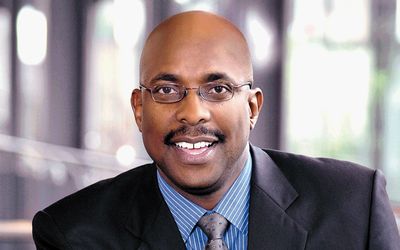
Brand SA CEO Miller Matola. Picture: FINANCIAL MAIL
BRAND SA works hard to improve South Africa’s global reputation and to position the country as an investment destination and trade partner, says Brand SA CEO Miller Matola.
"The purpose of this work is to contribute to South Africa reaching its defined strategic goals of internal human and economic development, while also contributing positively to the African and global environments," he says.
In a year when South Africa hosted the first annual Brics (Brazil, Russia, India, China and South Africa) summit on the African continent, the theme of the fifth summit reflected changes taking place in the global political economy.
The theme, Brics and Africa: Partnership for Development, Integration and Industrialisation, aimed to address questions regarding the benefits SA and Africa can derive from the other Brics countries.
In April, Brand SA released a research report that looked at understanding South Africa’s competitiveness in a changing global environment. The report identified key strengths that are unique to the South African economy.
Matola says the broader context of South Africa’s inclusion into Brics and its competitiveness performance, compared with other developing nations, shape the approach taken by Brand SA.
Performance highlights include the World Economic Forum’s competitiveness report that ranks South Africa 15th globally for quality of air transport infrastructure, while the country’s financial services sector, banks and stock exchange are top global performers. Furthermore, South Africa, if compared with other Brics countries, comes first in five of the 10 criteria the World Bank uses to assess ease of doing business. These are in starting a business; dealing with construction permits; getting credit; protecting investors; and paying taxes.
"This means South Africa offers protection to foreign direct investments, and certainly has a business-friendly environment wherein new trade, investment and related economic interactions can be fostered," he says.
As South Africa heads for 20 years of democracy it is important to assess the road travelled thus far, and to understand the position the country occupies globally as a developing nation in the early 21st century, Matola says.
Brand SA research head Petrus de Kock says the report presents key findings. Significant findings include an analysis of indicators showing that South Africa is a top performing globally competitive developing nation.
In a rapidly changing global economic and geopolitical environment, competition for foreign direct investment, trade opportunities and related business activity is increasing.
South Africa performs well in comparison with fellow developing nations. As such, South Africans can have confidence in the capabilities, skill and knowledge necessary to improve South Africa’s overall global competitiveness.
South Africa’s institutions and infrastructure ranking also outperform those of the Next 11 group (Bangladesh, Egypt, Indonesia, Iran, Mexico, Nigeria, Pakistan, Turkey, South Korea, Vietnam and the Philippines). It is also ranked higher on goods and market efficiency, financial market development, technological readiness, business readiness and innovation.
In addition, South Africa equals the Next 11’s average on higher education and training as well as market size.
According to the Institute for Management Development (IMD), South Africa improved its overall competitiveness ranking and performance from number 52 in 2011 to 50 in 2012. The IMD has been assessing competitiveness since 1989 and provides long-term measured assessments of the performance of 59 countries according to 329 criteria.
In terms of South Africa’s overall performance in 2012, the IMD report states the country has improved its ranking in government efficiency to 29 (up from 32 in 2011) and business efficiency to 37 (up from 40 in 2011). With infrastructure, it marginally improved to 54, up from 56 in 2011. It remains strong in the category of economic performance, but at 57 is down from 54 in 2011.
"From the WEF and IMD reports we learn that South Africa has been advancing slowly on the front of institutions and government efficiency," De Kock says.
The IMD identified the economic performance strengths of South Africa as cost-of-living index (ranked seventh), terms of trade index (ranked ninth), resilience of the economy (ranked 26th), tourism receipts (ranked 25th) and direct investment stock abroad (ranked 29th).
The weaknesses are the unemployment rate, direct investment flows abroad, GDP per capita and relocation services. However, these are not seen as threats to the future of the economy, but relate more to cyclical market trends and prevailing conditions in the global economy.

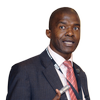

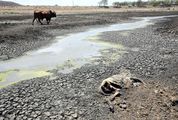

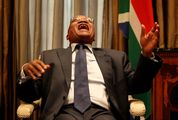


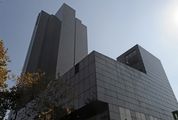

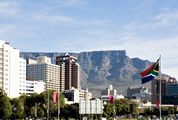










Change: -1.33%
Change: -1.57%
Change: -1.55%
Change: -1.55%
Change: -1.19%
Data supplied by Profile Data
Change: -0.39%
Change: -0.40%
Change: -1.33%
Change: 0.00%
Change: -0.40%
Data supplied by Profile Data
Change: 0.77%
Change: -0.21%
Change: 0.70%
Change: 1.11%
Change: 1.40%
Data supplied by Profile Data
Change: 0.97%
Change: 1.02%
Change: 0.44%
Change: 0.67%
Change: -0.68%
Data supplied by Profile Data